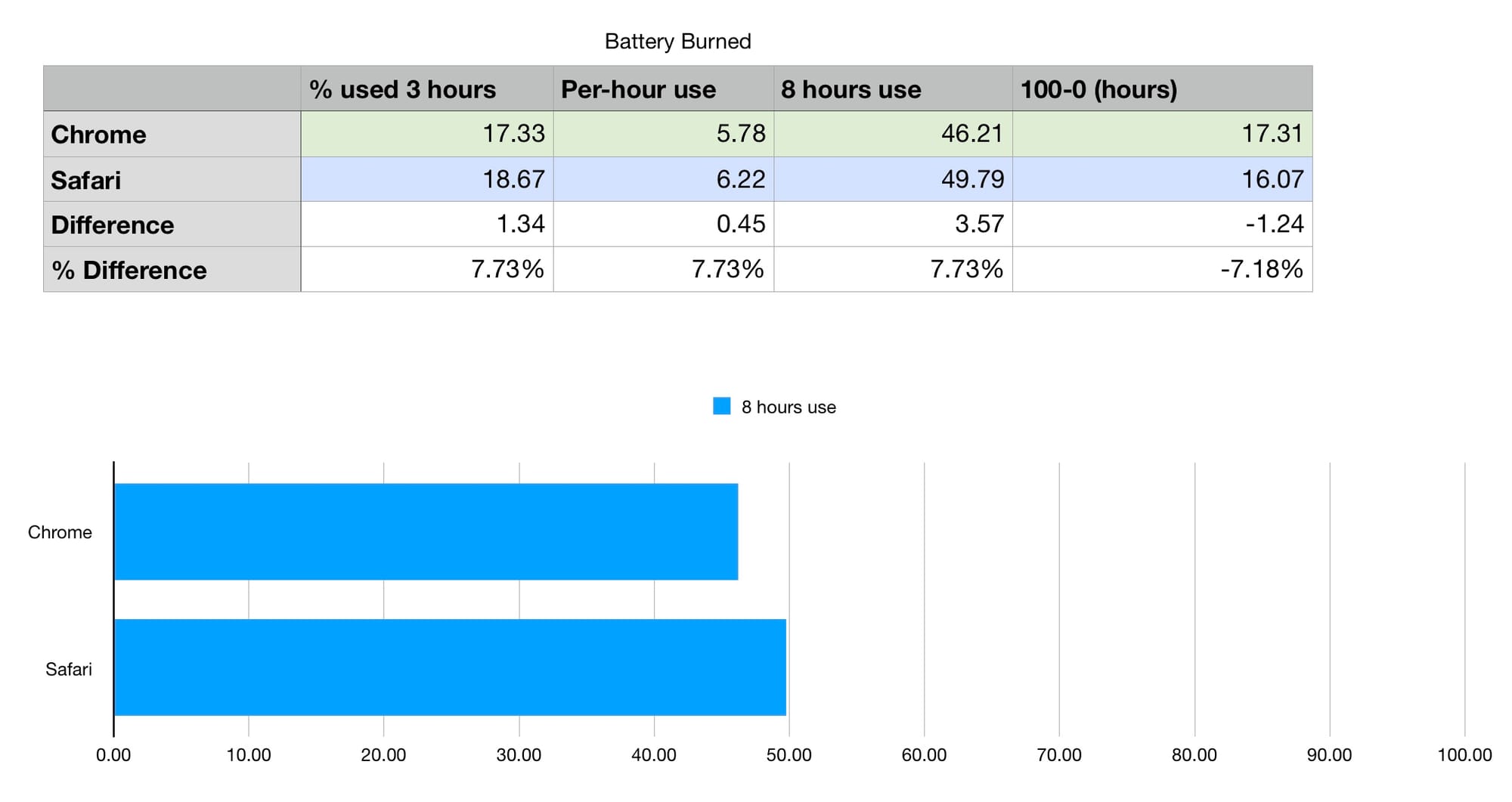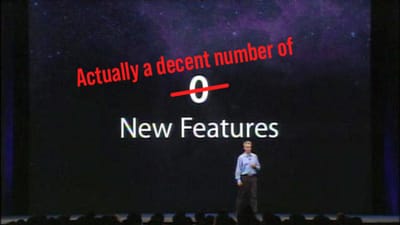Everyone says Chrome devastates Mac battery life, but does it? I tested for 36 hours to find out.
Long time Birchtree readers know I love data, and love data even more when I can throw it into a graph. I’m also a fan of testing things that everyone generally agrees are true, but no one seems to have any data to back up.
That brings us to the “Chrome devastates your Mac’s battery” claim that is commonly thrown around as fact, although rarely while citing any sources. This is presented as common knowledge. It’s as indisputable as gravity – a fact of the universe – Chrome crushes your battery and Safari sips it.
Right????
Well, I don’t love when things like this are said without any real or recent data to back them up. About 18 months ago, Google claimed they’d caught up to Safari in battery drain, so I decided to do some testing of my own. Conveniently, I recently had to wipe my MacBook Pro’s internal drive and restore to a clean version of macOS Sonoma (long story, but betas gonna beta) so I have pretty stock version of macOS running right now that would be perfect for some testing.
I’ll say right here that I have spent 3 days running these tests over and over (and overnight!) to make sure the results I’m presenting are as accurate as possible. I’ve also noticed a decent level of variance from test to test, as well as that macOS may have a non-linear representation of battery life, so running the test at numerous battery levels was important to get more useful data.
The test
My test device was a 14” MacBook Pro with an M2 Pro processor and 16GB RAM. I’ve owned it for about 2 years. I have the stable releases of each browser installed: Chrome 128 and Safari 17.6.
Using Keyboard Maestro to create a crazy macro, I’ve set up a 20 minute loop that I can run as many times as I want. This macro will:
- Open a YouTube video and watch it for 10 minutes
- Open Mastodon and scroll for 4 minutes
- Open 9to5Mac and scroll for 2 minutes
- Open a New Yorker article and scroll for 2 minutes
- Open a Google Doc and type for 2 minutes
I do close the YouTube video when it’s done, but I leave the other tabs open so at the end of each test run I have quite a few tabs in the browser window.
This simulates some of the common things I do in the browser, from watching videos to reading social media to working to reading articles. I did most of the testing with just 1Password installed on each browser, but I did install an ad blocker on both for a few tests, but they didn’t change the results at all for me.
I elected to have the test loop 9 times, making it a clean 3 hour browsing session. I think that’s enough to both count as a serious browsing session and as enough time to see what a difference it makes in battery usage. I initially tried a 1 hour testing session, but Apple silicon Macs are so efficient, it barely moved the needle on battery percentage.
I had the display brightness set to about 30%, which is dimmer than I would normally use, but is in the realm of possibility, especially for someone who is concerned with eking out the most of their battery. It also reduces the battery drain caused by simply running the display, an attempt to further isolate the impact that the web browser had on battery life. I also did one run for each at 50% brightness and the difference was within the normal variance I was seeing from test to test, so not huge.
I ran the 3 hour test 6 times for each browser, amounting to 36 total hours of data. I charged the MacBook up to 100%, ran the 3 hour Safari test, noted where the battery percentage was, and then ran the 3 hour Chrome test, noting where the battery was after that. Then I ran it again with Safari and Chrome before the battery got too low to do it again. I then charged back to 100% and did it all over again, which time starting with Chrome. My intent was to eliminate the possibility that macOS displays battery percentage non-linearly, so I wanted to have each browser represented in each window of battery life.
I kept the computer in the same spot for each round of testing to try and remove any variance in Wi-Fi strength
Finally, in terms of other apps in use, no apps in my dock were open, however a few utility apps like Pastebot, iStat Menus, Tailscale, and Bartender were running in the menu bar. I chose to keep these running since they generally have little impact, they aren’t being used actively during this test, and all Mac users will have a few of these sorts of things running anyway, so I’m favoring realistic use over clinical, lap-based computer usage.
One quick bit of meta commentary on this testing: this would have been a lot easier to do on Intel Macs a few years ago. These Apple silicon Macs really just sip battery when all you’re doing is browsing the web.
The results
Disclaimer: You probably get less battery life on your MacBook than I got in these tests. That’s not surprising, as you likely have things like music playing, Slack or Discord open, and maybe you’re doing something really heavy like video editing. That’s introduced too many variables in my opinion for this test, so I omitted them. Further testing could be done to see how much battery usage changes once you do have other apps doing things on your Mac throughout the day as well. This took forever already, so I limited scope to finding out if Chrome used an absurd amount of extra energy compared to Safari – by some people’s measure, enough that it ought not be allowed to exist on iPhones and iPads.
A quick note on variability
I will also say that there was a decent amount of variability from test to test, which is why I ended up running it so many times. After the first test run, Safari was showing 10% less battery usage than Chrome. However, in the second run, Chrome used 14% less than Safari.
And that, ladies and gentlemen, is why I ran the test many times and at all battery levels!
Before running this test myself, I checked YouTube and the web for other people who had don’t similar tests, and it seems most if not all of them ran a single test and called it a day. Based on the margins at play and the variance I saw across my 6 test runs and 36 hours, I wouldn’t trust anyone who says they only ran their test once.
From what I can tell, macOS reports battery life at a not perfectly linear scale. It seems the reported numbers drop a bit slower from 100% down to 90% than they do from 40% to 30%. It’s not massive, but I always saw the least drop in percentage in the tests that started from a full charge.
Also as mentioned above, this is not perfectly scientific, so I’m hoping that running each test many times over 36 hours of testing will help normalize any variance in my testing methods.
Ok, actually the results
In my 3-hour tests, Safari consumed 18.67% of my battery each time on average, and Chrome averaged 17.33% battery drain. That works out to about 9% less battery drain from Chrome than Safari. Yes, you read that right, I found Chrome was easier on my battery than Safari.
While I did experience some variability in each 3 hour test run, Chrome came out on top in 5 of the 6 direct comparisons.
This result is the opposite of what “common knowledge” is about this situation, which is why I checked and rechecked my methods and ran the test many times to make sure it wasn’t a fluke result.

But what does this amount to in real world use? One way to look at it is in how much battery you’d consume with a full 8 hour day of work. Using Chrome would leave you with 54% of your battery remaining, and Safari would leave you with about 50% left in the tank. Is that a difference? Sure, but if I work all day and see my battery is at 54% or 50%, I’m impressed either way.
Another way is to look at how long you could go from 100% to a dead battery with this consistent browsing. You’d last 17.3 hours with Chrome and 16.1 hours with Safari. Again, this is with screen brightness relatively low and no other apps on your computer sucking up tons of resources.
But those are pretty lengthy tests, what if you’re typically plugged into a monitor and power all day, but sometimes you go to a coffee shop to work for a few hours sometimes? That’s why I thought this 3-hour test was illustrative, and in that case the results are positively boring. A 3-hour light browsing and working session in Chrome drains about 17% of your battery and Safari drains about 18%. It’s a question of whether you pack your laptop back up with 83% or 82% battery remaining, to which I would ask, “literally who cares?”
My takeaways
I wrote this post after years of hearing people say that Safari was great on battery life and Chrome was a battery vampire. More recently, I read the argument that it’s so bad that Chrome running it’s Chromium engine ought not be allowed to exist on iPhones and iPads. My findings tell me that everyone should put this myth that Chrome is somehow the worst battery hog in the world to rest. I’d be happy to see other testing that shows different results, but if you spend most of your browsing time watching YouTube, browsing social media, looking at sites and articles with tons of ads, and working in Google web apps, I don’t see any evidence that Chrome is fundamentally flawed. If it was, I would have expected it to rear its ugly head here, and in fact it outperformed Safari.
But this is not to tell every Safari user that they are irrational or wrong in any way for using Safari over Chrome (or any other browser, for that matter). Does Safari use more battery than Chrome? In these tasks it sure seems to, but it’s not by a massive amount, potentially costing you about 0.5% of your battery life every hour. Is that enough for you to switch browsers if you prefer Safari’s UI or reliability or privacy options? I suspect not.
Now let’s say my testing is off somehow, and actually if I’d changed what sites I was using to test, Safari would actually come out 9% ahead instead of Chrome. That would surely get all of the Safari fans to say, “I told you so, this is why I use Safari.” But I would challenge you to think about how you reacted in the last paragraph to the idea that Safari might actually be using a little more battery than Chrome. Did you immediately turn on Safari, or did you think about all the other things you like about it? Similarly, this is how Chrome users feel when someone can’t comprehend why they would use a browser that supposedly used more battery. Perhaps they preferred Chrome’s site compatibility, extension support, and UI as well.
Cards on the table, I’m an Arc guy on the desktop, but if I had to choose between Safari and Chrome, I’d go with Safari because despite being annoyed by its more common rendering issues and less robust/stable extension support, I prefer using it to Chrome. I certainly didn’t do this test as some sort of way to prove that what I think is my 4th favorite desktop browser (Arc, then Vivaldi, then Safari, then Chrome) is so great – I don’t even use it!
I’d like to see more good-faith testing done in this space, and I’d love to see more exploration into what browsing habits might lean towards favoring one browser over the other. Is it a coincidence that my browser needs happen to align with Chrome’s strengths, or are these results consistent across all users? Now that I have some tooling in place for automating these tests, maybe I’ll do some with the inevitable feedback this post gets about how I did it wrong, all wrong! Hit me up on Mastodon (@matt@isfeeling.social) if there’s anything you’d like to see in future potential testing.
P.S. I do plan on recording a short video showing my testing methods more closely, and will add it to this post when I do.


